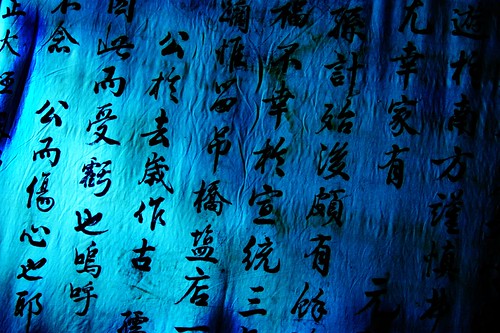Chinese Characters - A Litteral Mess
Disclaimer: The following post was written during the agonies of a night time study hour trying to hammer in Chinese characters into tired brain cells. Chinese character studies is not a good night time occupation, and I do not hate the Hanzi as much as it might seem below. I like them for their beauty and historical value, but every now and then I frustrate myself over their apparent insurmountability.
Ok, so what's the deal? Why do they necessarily have to keep the out-dated Hanzi system of writing? I am trying and trying to penetrate the Chinese language and, honestly, I'm doing quite well, at least when it comes to talking and listening. But when it comes to writing I am totally lost. It is nothing like the other languages of the planet, languages that ages ago adopted very fine and intelligent phonetic alphabets. P-H-O-N-E-T-I-C-A-L. Can it be any easier? You hear a word and immediately know how to write it. So simple yet so smart. I don't think that I fully appreciated that before I stuck my nose into the Hanzi jungle of basic strokes, water radicals and stroke orders.
Alright, there are ways of guessing half of the pronunciation of a character by only looking at its components, but still, even if you manage to get the right sound you still have a handful of tones to choose between. This is hard, even for the Chinese. It is so hard that the Chinese government has chosen only 2000 of the most common characters that people have to be able to recognise by the time they finish high school. 2000 out of more than 60 000!
My only friend in this huge mess is the Pinyin. Thank God for Pinyin! No, actually, thank Mao Zedong for Pinyin. Please don't misunderstand me, I am not trying to place the two on the same level, but Mao and his CCP were actually quite responsible for the introduction of this splendid system. It is quite a bit like magic - all of a sudden there is a good possibility of knowing how to pronounce what's read and how to write what's heard. It is a blessing hard to explain - you really need to experience the Grief of the Hanzi to understand the Relief of the Pinyin. Wouldn't it be just great if it stopped right there? If you got along with only the Pinyin, no more, no less? Hell no, the Chinese like to keep their treasure close to the heart. Why give it all away just to make things easier for everyone? Because they like it.
Wouldn't it be just great if it stopped right there? If you got along with only the Pinyin, no more, no less? Hell no, the Chinese like to keep their treasure close to the heart. Why give it all away just to make things easier for everyone? Because they like it.
Well, quit liking it then. Drop it, I say, loose it. Here the culture vulture might sniff and declare that it "would be a terrible loss should this magnificent millenia-old cultural treasure go to the grave..." But, it-would-not-go-to-the-grave! Understand that! Nearly every language that has already taken the step has left remnants for following civilisations to appreciate, and that was before people even cared to take note of such things. Today there is a whole world of information storing that will be able to save the Hanzi for future use.
There is, however, one good feat with the character thing. Since so many characters sound almost the same, though written totally differently, Chinese Internet dissidents have a relatively easy way of "coding" their texts. This becomes extremely handy in a country where everything published online has to pass the "Great Firewall" - the filters that alarm at the tiniest bit that can be suspected to be of any harm to the government. The possibility of using phonetic coding gives the dissidents a way of expressing "banned" words with other words. Funny little twist, that.

No comments:
Post a Comment